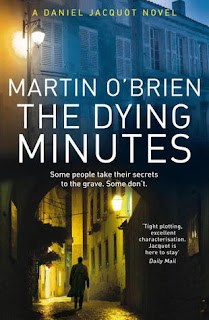'A little bit of mischief. Deadly mischief.'
Chief Inspector Daniel Jacquot is a detective working in the South of France. One day quite out of the blue he receives a surprise gift, bequeathed to him by a fisherman, known as Philo, a recently deceased resident of Marseilles. Meanwhile, lawyer Claude Dupont also receives an unexpected package from one of the criminals he defended in the past, Pierre-Louis Lombard, who is now dying.
Chief Inspector Daniel Jacquot is a detective working in the South of France. One day quite out of the blue he receives a surprise gift, bequeathed to him by a fisherman, known as Philo, a recently deceased resident of Marseilles. Meanwhile, lawyer Claude Dupont also receives an unexpected package from one of the criminals he defended in the past, Pierre-Louis Lombard, who is now dying.
A robbery occurred in 1972 along the coast from Marseilles, we learn, and gold bullion was stolen, which has never been found since. Nor has anyone ever been arrested for the crime. The novel opens with a scene from the robbery, and then takes us forward to 1999 where we meet Jacquot, and Dupont. Jacquot is still carrying injuries sustained in his previous investigation, and is off work recouperating. During this time, he receives the aforementioned gift, a boat, and he quickly develops a strong affection and attachment to the vessel, Constance. He then has to explain this new aquisition to his partner Claudine, who is expecting their baby.
Meanwhile, his former police colleague, Isabelle Cassier, reappears in Jacquot's life, asking him about an old acquaintance, and seeking his help with her current murder investigations, as the search for the missing gold intensifies and involves two very violent criminal gangs from the area. Dupont's gift leads him to a left-luggage locker at the station, and a holdall containing many secrets. Jacquot looks amongst the many books left in his possession on the boat, and there is a lovely, evocative description as he visits one of the bookshops where he believes Philo purchased some of the books:
'As Jacquot went deeper into the shop the darker the passage way between the bookshelves became, the dustier and more valuable the stock: leather-bound collections, fine gold lettering on scarlet squares, spines ribbed and rubbed, the dusty scent of the centuries.'
This is a very well-written, intelligent and intriguing crime story, with an involving plot. Jacquot is a charming character, with a keen eye for clues, a quick mind, and a skill for putting the elements of evidence slowly together: 'It was always like this at an initial crime scene. Who? How? Where? When? Why? All you ever had were just a few loose pieces of a very large jigsaw...The trick was to find new pieces, and then fit them all together. Slowly to start with, then picking up speed.'
I felt that the atmosphere of the setting comes across so vividly, it really transports the reader over there, with the mention of delicious foods and fine wines, the boats on the water; the author conjures a very attractive sense of place for us as a backdrop to Jacquot's life, the criminal activity and the investigation. The chapters are short and the novel moves along at a steady pace. Though there are quite a number of characters introduced fairly early on, and this was a challenge at first, as you read on, they all begin to fit into the story as a whole. Similarly, it is quite a lengthy book but the storyline and different characters all maintain your interest.
The Dying Minutes is the seventh novel in the series to feature Daniel Jacquot. It is the first installment of the series that I have read, and I didn't find this a problem, indeed we pick up some aspects of his history as this novel progresses, such as the fact that he was formerly an international rugby player. He is a likeable lead character, and this is an absorbing story. Reading The Dying Minutes has made me want to pick up the earlier novels in the series and discover more about Inspector Jacquot's previous investigations.
I felt that the atmosphere of the setting comes across so vividly, it really transports the reader over there, with the mention of delicious foods and fine wines, the boats on the water; the author conjures a very attractive sense of place for us as a backdrop to Jacquot's life, the criminal activity and the investigation. The chapters are short and the novel moves along at a steady pace. Though there are quite a number of characters introduced fairly early on, and this was a challenge at first, as you read on, they all begin to fit into the story as a whole. Similarly, it is quite a lengthy book but the storyline and different characters all maintain your interest.
The Dying Minutes is the seventh novel in the series to feature Daniel Jacquot. It is the first installment of the series that I have read, and I didn't find this a problem, indeed we pick up some aspects of his history as this novel progresses, such as the fact that he was formerly an international rugby player. He is a likeable lead character, and this is an absorbing story. Reading The Dying Minutes has made me want to pick up the earlier novels in the series and discover more about Inspector Jacquot's previous investigations.
Published by Preface, an imprint of Random House.
Thanks very much to the publisher for kindly sending a review copy of this novel.
4.5/5

This sounds not unlike the Commandant de Palma series by Xavier-Marie Bonnot, I would recommend them if you enjoyed this - set in the same area & full of suspense!
ReplyDeleteI haven't come across that series before Marie, thanks for introducing me them - off to investigate!
Delete